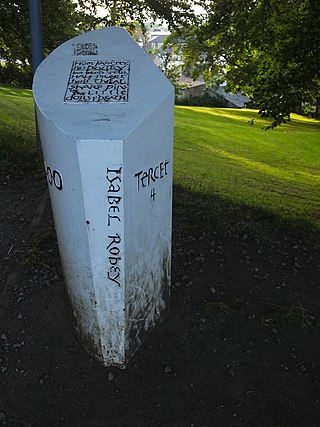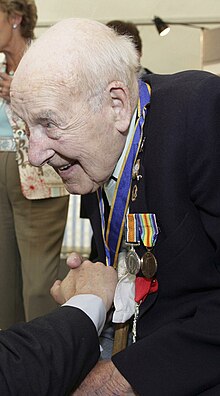
Wilfred Edward Salter Owen MC was an English poet and soldier. He was one of the leading poets of the First World War. His war poetry on the horrors of trenches and gas warfare was much influenced by his mentor Siegfried Sassoon and stood in contrast to the public perception of war at the time and to the confidently patriotic verse written by earlier war poets such as Rupert Brooke. Among his best-known works – most of which were published posthumously – are "Dulce et Decorum est", "Insensibility", "Anthem for Doomed Youth", "Futility", "Spring Offensive" and "Strange Meeting". Owen was killed in action on 4 November 1918, a week before the war's end, at the age of 25.

Dame Carol Ann Duffy is a Scottish poet and playwright. She is a professor of contemporary poetry at Manchester Metropolitan University, and was appointed Poet Laureate in May 2009, and her term expired in 2019. She was the first female poet laureate, the first Scottish-born poet and the first openly lesbian poet to hold the Poet Laureate position.

Simon Robert Armitage is an English poet, playwright, musician and novelist. He was appointed Poet Laureate on 10 May 2019. He is professor of poetry at the University of Leeds.

Sir Andrew Motion is an English poet, novelist, and biographer, who was Poet Laureate from 1999 to 2009. During the period of his laureateship, Motion founded the Poetry Archive, an online resource of poems and audio recordings of poets reading their own work. In 2012, he became President of the Campaign to Protect Rural England, taking over from Bill Bryson.
"Dulce et Decorum Est" is a poem written by Wilfred Owen during World War I, and published posthumously in 1920. Its Latin title is from a verse written by the Roman poet Horace: Dulce et decorum est pro patria mori. In English, this means "it is sweet and fitting to die for one's country". The poem is one of Owen's most renowned works; it is known for its horrific imagery and its condemnation of war. It was drafted at Craiglockhart in the first half of October 1917 and later revised, probably at Scarborough, but possibly at Ripon, between January and March 1918. The earliest known manuscript is dated 8 October 1917 and is addressed to the poet's mother, Susan Owen, with the note "Here is a gas poem done yesterday ."

Henry William Allingham was an English supercentenarian. He is the longest-lived man ever recorded from the United Kingdom, a First World War veteran, and, for one month, the verified oldest living man in the world. He is also the second-oldest military veteran ever, and at the time of his death was the 12th-verified oldest man of all time.

Dulce et decorum est pro patria mori is a line from the Odes (III.2.13) by the Roman lyric poet Horace. The line translates: "It is sweet and proper to die for one's country." The Latin word patria (homeland), literally meaning the country of one's fathers or ancestors, is the source of the French word for a country, patrie, and of the English word "patriot".
Jessie Pope was an English poet, writer, and journalist, who remains best known for her patriotic, motivational poems published during World War I. Wilfred Owen wrote his 1917 poem Dulce et Decorum est to Pope, whose literary reputation has faded into relative obscurity as those of war poets such as Owen and Siegfried Sassoon have grown.

Henry John Patch, dubbed in his later years "the Last Fighting Tommy", was an English supercentenarian, briefly the oldest man in Europe, and the last surviving trench combat soldier of the First World War from any country. Patch was not the longest-surviving soldier of the First World War, but he was the fifth-longest-surviving veteran of any sort from the First World War, behind British veterans Claude Choules and Florence Green, Frank Buckles of the United States and John Babcock of Canada. At the time of his death, aged 111 years and 38 days, Patch was the third-oldest man in the world, behind Walter Breuning and Jiroemon Kimura.

Imtiaz Dharker is a Pakistani-born British poet, artist, and video film maker. She won the Queen's Gold Medal for her English poetry and was appointed Chancellor of Newcastle University from January 2020.

The World's Wife is a collection of poetry by Carol Ann Duffy, originally published in the UK in 1999 by both Picador and Anvil Press Poetry and later published in the United States by Faber and Faber in 2000.
Nationality words link to articles with information on the nation's poetry or literature.

The British Poet Laureate is an honorary position appointed by the monarch of the United Kingdom, currently on the advice of the prime minister. The role does not entail any specific duties, but there is an expectation that the holder will write verse for significant national occasions. The origins of the laureateship date back to 1616 when a pension was provided to Ben Jonson, but the first official holder of the position was John Dryden, appointed in 1668 by Charles II. On the death of Alfred, Lord Tennyson, who held the post between November 1850 and October 1892, there was a break of four years as a mark of respect; Tennyson's laureate poems "Ode on the Death of the Duke of Wellington" and "The Charge of the Light Brigade" were particularly cherished by the Victorian public. Four poets, Thomas Gray, Samuel Rogers, Walter Scott and Philip Larkin turned down the laureateship. Historically appointed for an unfixed term and typically held for life, since 1999 the position has been for a term of ten years. The holder of the position as at 2024 is Simon Armitage who succeeded Carol Ann Duffy in May 2019 after 10 years in office.

"Harry Patch (In Memory Of)" is a song by the English alternative rock band Radiohead. The song is a tribute to the British supercentenarian Harry Patch, the last surviving soldier to have fought in the trenches during World War I. Radiohead self-released it on 5 August 2009 as a downloadable single for £1 from their website, with all proceeds donated to the Royal British Legion. It was added to streaming services on Remembrance Day 2016.
Poetry Live is a series of annual events in venues across the UK where poets perform their poetry for school children studying GCSE level English Literature.

Rachel McCarthy is a British scientist, poet and broadcaster.
The Ted Hughes Award was an annual literary prize given to a living UK poet for new work in poetry. It was awarded each spring in recognition of a work from the previous year. It was a project which ran alongside Carol Ann Duffy's tenure as Poet Laureate, which ended when Duffy finished her 10 years as Poet Laureate in 2019
The Poetry Archive is a free, web-based library formed to hold recordings of English language poets reading their own work. The Archive holds over 20000 poems and keeps the recordings safe and accessible so that current and future visitors can enjoy them. Each poet's work is surrounded by contextual information and biographies and has become a treasured resource for anyone looking for poetry.
Elizabeth Lefroy is a British poet.

The Lancashire Witches Walk is a 51-mile (82 km) long-distance footpath opened in 2012, between Barrowford and Lancaster, all in Lancashire, England. It starts at Pendle Heritage Centre in Barrowford before passing through the Forest of Pendle, the town of Clitheroe and the Forest of Bowland to finish at Lancaster Castle.















